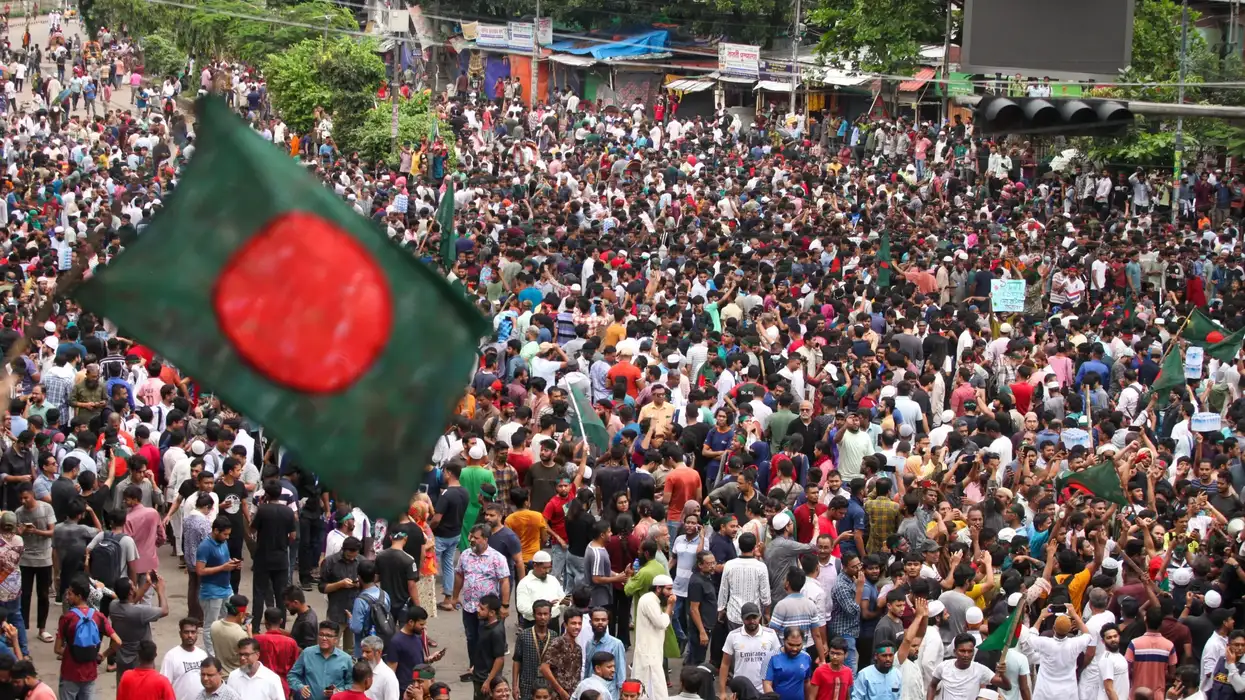OVER 100 people have been killed in violence across Bangladesh following the resignation and departure of prime minister Sheikh Hasina on Monday. As news of her exit spread, chaos erupted, leading to widespread vandalism, looting, and clashes throughout the country.
The situation in Dhaka began to stabilise on Tuesday morning, with public transport resuming and shops reopening.
However, the capital saw significant unrest the previous day, with protesters attacking Hasina's residence, Sudha Sadan, and other properties linked to her Awami League government. Residences and business establishments of ministers, MPs, and party leaders were also targeted.
Local media reported that 119 people were killed in attacks on Hindu temples and various other locations.
Prothom Alo, a Bengali-language daily, reported at least 109 deaths during Monday's clashes, primarily due to the anti-discrimination student movement's final push. The newspaper also reported that 440 people have died in related violence since July 16.
Dhaka Medical College Hospital received 37 bodies between 11 am and 8 pm on Monday, with hospital sources stating that 500 people were treated for injuries, including bullet wounds.
The Dhaka Tribune reported that 18 people were killed in the Savar and Dhamrai areas on the outskirts of the capital, and 10 more in Dhaka's Uttara area, where civilians reportedly opened fire on protesters.
Other fatalities included six people in Habiganj, eight in Jessore, three in Khulna, three in Barisal, 11 in Lakshmipur, six in Kushtia, three in Satkhira, and six in Sreepur of Gazipur.
President Mohammed Shahabuddin urged political parties to restore law and order and directed the armed forces to protect lives and property.
Despite the reopening of educational institutions on Tuesday, attendance remained low, with many students still wary of the ongoing unrest.
"The institution is open, and some girls have come, but attendance is low. Attendance will increase in a couple of days," said Md Rahamot Ullah, principal of Kisholoy Girls' School and College in Mohammadpur.
Foreign secretary David Lammy addressed the situation, calling for an end to the violence and a full UN-led investigation into the events of the past weeks. "The last two weeks in Bangladesh have seen unprecedented levels of violence and tragic loss of life. All sides now need to work together to end the violence, restore calm, de-escalate the situation, and prevent any further loss of life. The people of Bangladesh deserve a full and independent UN-led investigation into the events of the past few weeks," Lammy said.
Meanwhile, an Indian cultural centre in Dhaka and four Hindu temples across Bangladesh were vandalised on Monday. The Indira Gandhi Cultural Centre in Dhanmondi suffered damages, and several other key locations in Dhaka, including the Bangabandhu Bhaban, were set on fire.
The Indian cultural centre, which promotes bilateral cultural linkages, has been a target of the unrest. The centre houses a library with over 21,000 books on Indian art, culture, politics, economics, and fiction. Kajol Debnath, a leader of the Hindu Buddhist Christian Unity Council, confirmed reports of damages to the Hindu temples, describing them as "minor damages." However, some Hindu community leaders remain fearful in the wake of the tense situation following Hasina's ouster.
Trouble had been steadily escalating since the government's announcement of the quota system in June. Hasina, 76, had been in power since 2009 but was accused of rigging elections in January and then watched millions of people take to the streets over the past month demanding she quit.
Hundreds of people died as security forces sought to quell the unrest, but the protests grew and Hasina finally fled Bangladesh aboard a helicopter on Monday as the military turned against her.
(With inputs from agencies)




